- Home
- Andy Andrews
The Traveler's Gift Page 2
The Traveler's Gift Read online
Page 2
When he had gotten out of the shower that morning, he heard Ellen hanging up the phone. “Who was that?” David asked.
“It was Dr. Reed’s office, David,” she said. “I’ve got to take her in to see what’s wrong. Tylenol isn’t handling this.”
“What kind of parent am I?” David said aloud, interrupting his reverie as he pulled the Colt into a parking place behind Marshall’s Hardware. “What kind of person am I? What has happened to me?”
When Ellen mentioned the doctor, he blew up. Where did she think the money was coming from, he yelled, and of course, she yelled right back that she’d steal it if she had to. This was their daughter, she shouted. Didn’t he care about that anymore? As David left the house, he went by Jenny’s room to kiss her good-bye. She had big tears rolling down her face. Jenny had heard everything.
About ten that morning, David was loading shingles on a flatbed truck in front of the store. He was grateful for the activity. The shingles were heavy, and they gave him somewhere to focus his anger. “Ponder!” someone yelled. David looked up. It was Mr. Marshall, the owner of the store. A tall, lanky old man with curly white hair and a red nose, he was leaning out the back door, motioning to David. “Phone call,” he barked as David strode past him into the warm store. “It’s your wife. Make it quick. I’ve told you about personal calls.”
“Ellen,” David said as he picked up the phone. “Where are you?”
“I’m at home,” she said. “We just got back from the doctor.”
“What did he say?”
“David, it’s her tonsils.”
“Okay?”
Ellen paused. “Honey, Dr. Reed said her tonsils have to come out. He said we need to have it done right away.”
“Ponder!”
David looked around. It was Mr. Marshall. “Let’s go, son,” he said. “I got a driver waiting on you.”
“David? Are you there?” he heard Ellen ask through the phone.
“Yes. Yes, I’m here,” he said. “Ellen, we have no insurance.”
“I’ve already checked,” she answered. “The operation, including the hospital, will only cost eleven hundred dollars.”
David was stunned. “We don’t have eleven hundred dollars,” he said.
“We can put it on a credit card.”
“Hey, Ponder. This is the last time I’m going to tell you. Get off the phone,” the store owner warned.
David put his hand over his ear, trying to concentrate on the conversation with his wife. “We don’t have any room on a credit card, Ellen. Every card is maxed out.”
Ellen started to cry. “Then we’ll just have to borrow the money, David. Jenny is sick.”
“I know Jenny’s sick, honey, but we can’t borrow anything. We’re a month behind on the house, two months on your car. No bank will touch us. My parents don’t have any more money to loan, and God knows, yours don’t. With your dad’s lawn business, they struggle through the winter just to make it themselves.”
Ellen could hardly talk through her tears. “Oh, David. What are we going to do?”
“Don’t worry,” he said. “I’ll get the money somehow. Maybe I can work overtime here. Or maybe I can get an advance. I’ll get the money.” As Ellen continued to cry, David pleaded with her: “Honey, please calm down. I have to go. I’ll take care of this, I promise. I love you.” He hung up the phone.
Turning to move from behind the counter, David met Mr. Marshall face-to-face. “I’m sorry . . . ,” he started to say, but the old man cut him off.
“Your next job, you need to pay attention to the rules,” Marshall said.
David was confused. “Excuse me?” he asked.
“You can come back on Friday, and your check will be waiting. I’m letting you go.”
“I’m . . . I’m fired?” David stammered. “I’m fired because I used the telephone?” Marshall stood there with his arms crossed. “My daughter is sick.” The old man didn’t say a word. David was incredulous. He pointed at the phone. “That was my wife calling because my daughter is sick.” David paused, then said once more, this time in almost a whisper, “My daughter is sick.” Raising and lowering his hands in a helpless gesture and shaking his head, David turned and walked slowly out the door.
Reaching the car, David fumbled for the keys and laughed. He had experienced a brief mental flash of the car not starting. “Mr. Marshall,” he saw himself saying, “my car won’t start. May I use your phone?” Twisting the key in the ignition, David laughed again as the car roared to life.
Obviously, he thought, I am laughing because I am cracking up. As David wheeled out of the hardware store parking lot, he wondered, If I’m sane enough to recognize insanity, does that mean I’m okay after all? He laughed again. This time he actually laughed until he cried.
Out on the interstate, David drove past the exit for home. Traffic was light, and it was only 11:15. No reason to go home and share the big news with Ellen just yet. Ellen doesn’t deserve this, David thought. And Jenny certainly did not choose me for a father. A year ago, I was on top of the world, and now, I can’t even provide for my family.
David pulled onto the shoulder. Bowing his head, he clasped his hands together. “Oh, God,” he said aloud. “Oh, God . . .” He stopped and was silent for almost a minute. “Oh, God . . . ,” he began again. After another minute, he put the Colt into gear and moved back onto the highway. I can’t even pray, he thought.
On an impulse, David took the Grayton exit. Almost forty miles from home, he was driving to nowhere in particular. Just like my life, he thought, going nowhere in particular, nowhere special. Didn’t I used to think I had a purpose? David wondered. Wasn’t I accomplishing something?
David looked at the speedometer. It read seventy. There were no other vehicles anywhere in sight. He pressed a little harder on the accelerator. Eighty . . . eighty-five. As he flew over hills and around curves, David became oblivious to the speed. Ninety miles per hour. His thoughts were also racing at a furious pace. Ellen was still young. She was beautiful. If he weren’t around, she could find someone else to take better care of her and Jenny. I still have life insurance, he thought. Would they be better off without me? Would everyone be better off without me?
Without any further conscious thought, David jammed his foot on the accelerator, pressing it down to the floorboard. The little car screamed as David gripped the steering wheel, trying to drive away from his life. With tears streaming down his face, he rolled the window down and steered into a straightaway. The freezing wind seemed to clarify his thoughts. “Why am I here?” David said aloud. “Why is this . . . why is everything happening to me?” He pounded his hand on the steering wheel, let his foot off the accelerator for a second, and then stomped it to the floor again. “Why . . . me?” he screamed. “Why me?”
At that instant, David’s moment of despair intersected with an icy bridge. Covering a small stream, the bridge was no more than fifty feet long, but its sheet of black ice sent the speeding car careening into a spin. Tires screeching, David’s car bounced off the guardrail as he crossed the short bridge and found himself still on the highway. He fought desperately for control as the car fishtailed from side to side and finally swerved off the road.
Many people, when faced with a life-or-death crisis, talk of seeing their past scroll before their eyes. They experience childhood, adolescence, and many years of living all in one split second. In that moment, one person might feel remorse while another gains an acceptance of the inevitable and receives a peaceful calm. David Ponder, on the other hand, had only questions in his heart as his car careened helplessly toward a giant oak tree. With his remaining conscious thought, David removed his hands from the steering wheel and raised them as fists to the sky. “Please, God!” he cried. “Why me?”
And then . . . nothing.
THREE
“PLEASE GET OFF THE FLOOR AND SIT IN THIS CHAIR.”
Slowly, David opened his eyes and looked directly into the face of a man who s
eemed vaguely familiar. A small, older gentleman, his short almost-white hair was neatly combed, contrasting with the slightly disheveled appearance of his clothes. The sleeves of his dress shirt were rolled up at the elbows, and his red-and-black-striped tie was loosened at the collar. Atop his sharp nose sat a pair of round spectacles that were thick enough to make his clear blue eyes seem huge.
“This is a very inconvenient time for me,” the man said. “Just sit right there and be very quiet.” Turning quickly, he walked toward a huge hand-carved desk. Settling himself behind it and picking up a stack of papers, he grumbled, “As if I don’t have enough happening right now.”
Confused, David glanced around. He was sitting on a large Persian rug, his back against the wall of an ornate, high-ceilinged room. Directly to his left was the hard-backed mahogany chair that had been indicated by the man who was now intently sorting papers across the room. To his right, a globe stood on a pedestal in front of an unlit fireplace.
Easing up and into the chair, David said, “I’m thirsty.”
Without looking up, the man replied, “I’ll get you something in a bit. For now, please be quiet.”
“Where am I?” David asked.
“Look here now.” The man cursed as he slammed the stack of papers down on the desk and pointed a finger at David. “I politely asked you to be quiet, and I’m expecting you to do it. You are in Potsdam, Germany, a suburb of Berlin in a free zone presently controlled by the Red army. It is Tuesday, July 24, 1945.” Taking a deep breath and appearing to calm down, he reached for his work again. Separating the papers, he said, “There now, sit and chew on that for a while.”
David wrinkled his brow. I must be in a hospital, he thought. This is a creepy old place. And if this guy is my doctor, he has a horrible bedside manner. Sitting absolutely still, trying to collect himself, David watched the man at the desk. Why would he tell me I’m in Germany? he wondered. And the Red army thing? I must have a head injury. Is this some kind of psychiatric exam?
He tugged at the collar of his dark blue sweatshirt. Uncomfortably warm, David noticed a water pitcher and some glasses on a small table near a window directly across the room. He stood up and walked slowly to the water. From the corner of his eye, David saw the man behind the desk briefly glance up, frown, and go back to his work.
David quietly poured a glass of water and, drinking it, looked out the window. He was obviously in a second-floor room of this building or house or whatever it was. Below him, no more than fifty feet away, was the bank of a slow-moving river. There were no people boating, no children playing—in fact, he didn’t see anyone at all. “Something isn’t right here,” David muttered as a breeze crossed his face and rustled the drapes beside him.
Reaching his arm through the open window, David was almost startled to find that the air was warm and humid. Then he realized what had been bothering him. It was the air itself. The air was warm. Every tree within sight was full of leaves, and the grass in the yard below him was green. In the dead of winter?
Putting his glass down on the table, David placed his hands on the windowsill and pushed his whole upper body through the opening. Yes, it was hot, he decided, and pulled himself back inside. What kind of place is this? David wondered. Why are the windows open in the first place? As hot as it is, the air conditioning should be running full blast.
As he moved back toward his seat, David looked around for a thermostat. There wasn’t one that he could see. The only temperature-controlling device was an old heater that someone had put in the fireplace. Not that that heater would do anyone any good, he thought. It’s so old, it looks like it could have been made in . . . , David stopped in midstride. In a soft voice, he said aloud, “. . . 1945.”
Wheeling suddenly, David faced the man behind the desk. The white-haired gentleman looked up and slowly pushed his work to the side. A slight smile on his thin lips, he leaned back into his chair, crossed his arms, and peered curiously at David.
David’s mind raced furiously. Potsdam . . . Potsdam . . . , he thought. Why is that name so familiar? Then, like a thunderbolt, it came to him. Potsdam, Germany, he remembered from a television documentary, was the site of the famous war conference after which the decision had been made to drop the atomic bomb on Japan during World War II.
A shudder passed through his body as David put his hands to his head. Think, think, he commanded himself. Who attended the war conference in Potsdam? It was Churchill, Stalin, and . . . All the breath seemed to go out of David at once as he groped for the chair behind him. Sitting down heavily, he stared at the man in front of him. “You’re Harry Truman,” he said in a shocked tone.
“Yes,” the man said, “I am. Though at the moment I would give anything to be almost anyone else.”
Swallowing audibly, David said, “They call you ‘Give ’Em Hell Harry.’”
Truman grimaced. “I never give anybody hell,” he snorted. “I just tell the truth, and they think it’s hell.”
Removing his glasses, he rubbed his eyes and said, “Obviously, I’ll not be getting any peace from this point on, so we might as well go ahead and talk.” Putting his glasses back on, he rose and came out from behind the desk. “By the way,” he said, “why not you?”
“Excuse me?” David asked.
“Why . . . not . . . you?” Looking directly into David’s eyes, he enunciated the words carefully, separating them as if he were speaking to a child. “I believe that is the answer to the last question you asked before you arrived.”
David frowned. Trying to remember, he said, “I was in an accident, I think.”
“Yes,” Truman said, “that’s sometimes how this happens. And the last question a person asks is often, ‘Why me?’ Of course, ‘Why me?’ is a question great men and women have been asking themselves since time began. I know the thought has occurred to me more than once during the past few days. It’s hard for me to believe that twenty-five years ago, I was a clerk in a clothing store!” Truman extended his hand and pulled David to his feet. “What’s your name, son?”
“David Ponder. Am I okay?”
“Well, David Ponder, if you mean ‘Am I dead?’ the answer is no. If you simply mean ‘Am I okay?’” Truman shrugged, “I’m not sure. I’ve never been given any information on how these things turn out.”
Suddenly, David relaxed. Smiling, he said, “I understand. I’m dreaming, right?”
“Maybe you are,” the president said, “but, David, I’m not. And even if you are dreaming, that’s not a problem. For centuries, dreams have been used to communicate instruction and direction to people of purpose—great men and women. God used dreams to prepare Joseph for his future as a leader of nations. He gave battle plans to Gideon in a dream. Joan of Arc, Jacob, George Washington, Marie Curie, and the apostle Paul were all guided by their dreams.”
“But I’m an ordinary guy,” David said. “I’m nothing like any of the people you’ve mentioned—great, I mean—and I’m certainly no apostle Paul. I’m not even sure I believe in God anymore.”
Truman smiled as he put a hand on David’s shoulder. “That’s all right, son,” he said. “He believes in you.”
“How can you be certain of that?” David asked.
“Because,” Truman responded, “you wouldn’t be here if He didn’t. Occasionally, someone is chosen to travel the ages, gathering wisdom for future generations. It’s as if the Almighty literally reaches down and places His hand on a shoulder, and in this particular case,” the president peered over his glasses, “it was your shoulder.”
A sharp knock at the door drew their attention. Without waiting for a response, a large, stocky man strode into the room. It was Fred Canfil, Truman’s special bodyguard. Formerly the U.S. marshal from Kansas City, Fred was temporarily attached to the Secret Service and had become a favorite of the president and his family. “I’m sorry to barge in like this, sir,” he said as his eyes surveyed the room. “I thought I heard you talking to someone.”
“No, Fre
d,” Truman said as he looked directly at David, “no one here.” Then motioning toward the door with his hand, he said, “If you’ll see that I’m not disturbed?”
“Of course, Mr. President,” Canfil said as he slowly backed out, a concerned look on his face. Still glancing about, he added, “I’ll be escorting you to the conference room within the hour, but if you need me before then . . .”
“You’ll be right outside,” Truman said as he ushered his bewildered friend from the room, “and I won’t hesitate to call for you. Thank you, Fred.”
As the president closed the door, David asked, “He can’t see me?”
“Apparently no one can,” Truman replied. “No one, that is, except the person you came to visit. Of course, that makes me look a little crazy,” he said with a grin, “in here, all alone, talking to myself.” Quickly, he wiped the grin off his face and continued, “But I shouldn’t think anyone would find it strange. I have ample reason to be talking to myself, what with everything that’s going on here.” Truman cocked his head and looked at David from the corner of his eye. “It is curious how you people always seem to show up during critical points in my life.”
“So this has happened to you before?” David asked.
“Yes,” Truman said, “three times now since I became president, you being the third. The first time was the night Roosevelt died. I was all alone in the Oval Office, and this kid just appeared out of nowhere. Fred came busting through the door—almost gave me a heart attack. It was strange that no one could see him but me.”
“The kid?”
“Yeah, the kid.” Truman paused. “I say ‘kid.’ He was a teenager actually. He was having trouble deciding whether or not to finish college.”

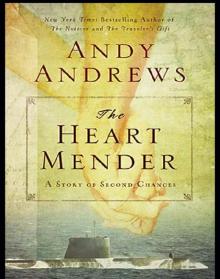 The Heart Mender: A Story of Second Chances
The Heart Mender: A Story of Second Chances The Final Summit: A Quest to Find the One Principle That Will Save Humanity
The Final Summit: A Quest to Find the One Principle That Will Save Humanity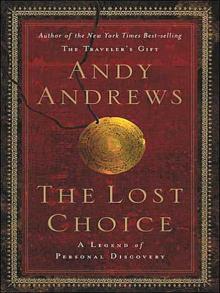 The Lost Choice
The Lost Choice Island of Saints: A Story of the One Principle That Frees the Human Spirit
Island of Saints: A Story of the One Principle That Frees the Human Spirit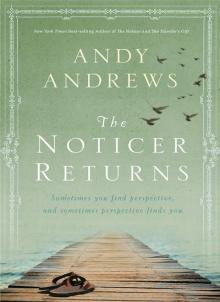 The Noticer Returns
The Noticer Returns Island of Saints
Island of Saints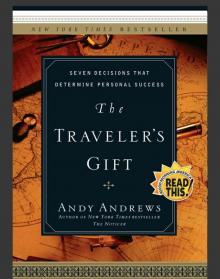 The Traveler's Gift
The Traveler's Gift The Final Summit
The Final Summit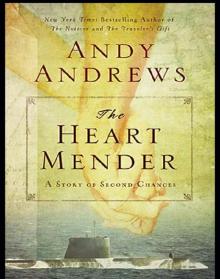 The Heart Mender
The Heart Mender